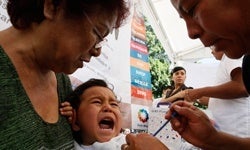August 15, 2012 — Despite periods of economic downturns and crisis, Mexico recently achieved a significant milestone – enrolling 52.6 million previously uninsured Mexicans in public medical insurance programs and thereby achieving universal health coverage in less than a decade.
This effort began in 2004 and occurred in a country of approximately 100 million people.
A paper published online August 16 in The Lancet by a group of public health officials — including HSPH Dean Julio Frenk, Felicia Knaul, Director of the Harvard Global Equity Initiative, and current Minister of Health of Mexico Salomón Chertorivski — notes that while significant progress has been made, challenges remain as the country seeks to minimize disparities in healthcare quality and ensure that there is effective access to health care services in rural areas that are traditionally underserved.
Dean Frenk was Minister of Health in Mexico from 2000-2006 and architect of the reforms approved by the Mexican Congress which enabled the introduction of Seguro Popular, an ambitious, government-funded program.
The aim of Seguro Popular is to ensure that even the poorest citizens have access to treatment for a range of preventative healthcare services such as vaccinations and diabetes screening, as well as treatment for chronic and catastrophic illnesses.
According to Knaul, as of April this year “every Mexican, regardless of their socioeconomic situation, has access to the financial protection in health that shields them from facing the terrible choice between impoverishment and suffering or even death.”
“Mexico devised and implemented a reform and then demonstrated, with evidence, how a large, middle-income country can transform its health system and successfully achieve universal health coverage in one decade,” said Minister Chertorivski, an alum of Harvard Kennedy School and a participant in the Harvard Ministerial Leadership Forum, which convened for the first time in June.
Several key health indicators have steadily increased since Seguro Popular was introduced, including the percentage of women receiving prenatal care, treatment of acute respiratory infections in children under five, and cervical cancer screenings. But it may be too soon to say whether these specific successes in Mexican health care are due chiefly to universal health insurance coverage.
The program was implemented with an emphasis on evaluating its effectiveness and improving policies based on the results of those evaluations, Dean Frenk notes. “The quest for universal health coverage has and will produce important lessons not only for Mexico, but also for other high and lower income countries,” he said.
Learn more
To learn more, read the full Lancet article here.
Listen to a Lancet podcast with Frenk and Knaul.
photo: Reuters/Stringer Mexico
